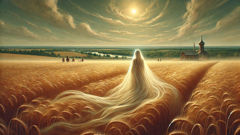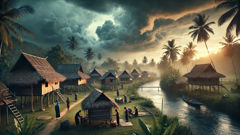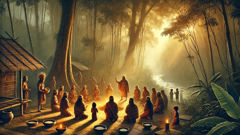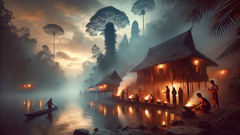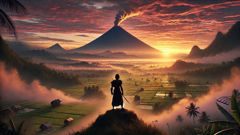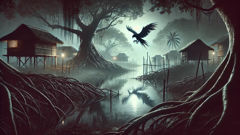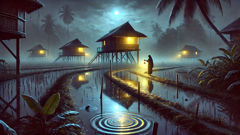Introduction
The steppe stretches in every direction, golden with ripening wheat that bends in the breath of the southern Russian wind. On a day when the sun rides high and fierce, the landscape hums with the energy of midsummer. There is no shade in these endless fields, only the wavering shimmer of heat rising from the earth and the promise of another harvest—if only the weather and the spirits allow. In this place, where the sky presses down with blinding light and the earth seems to exhale warmth, ancient stories take on a living presence. The villagers of Vesenya, a tiny hamlet near the Don River, have always known to respect the midday hour. Old mothers hush their children, and reapers wipe sweat from their brows and retreat under thatched awnings when the sun stands directly overhead. For they have heard—since childhood, whispered at dusk or warned at dawn—of the Poludnitsa. She is the Noon Witch, the white lady of the fields, who appears as a whirling column of air or a spectral maiden in linen, her face veiled and her eyes like polished amber. She is beautiful and terrible, the spirit of the unforgiving heat, and she punishes those who defy nature’s warning by working under the burning sun. Some say she asks riddles; others claim she spins like a whirlwind, scythe in hand, ready to cut down the reckless. The legend is woven into the very rhythm of the village: when to rest, when to labor, when to listen for the wind’s change. On this particular summer, as drought threatens and the crops thirst for rain, fear of the Noon Witch is stronger than ever. The people must balance their need to harvest with the peril that comes with disrespecting the ancient boundaries. And so the story unfolds—not just as a warning, but as a journey into the heart of human endurance, humility, and the eternal dance between people and the land they depend upon.
Beneath the Sun’s Gaze: The Law of Noon
Vesenya’s mornings are alive with purpose. Before dawn, the air is sweet and cool, birds chorus from willows by the river, and every thatched cottage stirs as families rise for the day’s work. The wheat fields are the village’s lifeblood, and the elders say that even the czar’s granaries envy their golden bounty. But each morning, as sickles are sharpened and baskets packed with rye bread and cucumbers, there is a hush—a reverent pause before the labor begins. For as much as the people love their land, they fear the time when the sun stands highest.
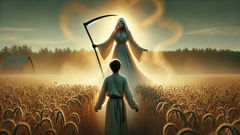
On this summer, the drought has stretched longer than any can remember. The river runs low and sluggish, and every cloud in the sky seems to drift away, refusing the promise of rain. Fields thirst, and so do the families who depend on them. The villagers whisper about omens: a swallow’s nest fallen from the eaves, a strange stillness at midday, or the sudden flare of heat that feels unnatural, like a warning. Grandmothers tell tales to children huddled in shade: of how the Poludnitsa once appeared to a stubborn young reaper named Ivan, who refused to leave his rows even as the bell tolled noon. They say she challenged him with a riddle, her voice soft as wind through grass: ‘What grows without root and dies without blade?’ Ivan stammered, too proud to admit ignorance, and the Noon Witch spun around him in a gleaming spiral. When the other workers found him, his eyes were wide and blank, his sickle fallen in the dirt. He never spoke again.
But these stories are not just warnings—they’re instructions. In Vesenya, no one works in the field from the moment the shadow disappears beneath their feet until the bell calls them back in the afternoon. Children are kept indoors, and even animals are tethered under willow trees. For those who dare to challenge the old laws, consequences are swift and severe. Yet this year, hunger gnaws at the edges of caution. The elders fret over every stalk of wheat lost to the sun, and tempers fray as days grow hotter. Some of the younger men—brash and desperate—begin to murmur that perhaps the Noon Witch is only a tale to keep them idle when the fields most need their hands.
One such skeptic is Luka, a broad-shouldered youth with hair the color of burnt straw and a heart full of impatience. He’s never seen the Poludnitsa, and he laughs when old women trace protective signs over his brow. He boasts to his friends that he could work the noon hours and bring in more wheat than any other. One day, with the fields shimmering and his mother pleading at his side, Luka hefts his scythe and strides into the blaze of midday.
The world is different under that sun. The light is a hammer, flattening color and sound; the air is thick and wavering, each breath an effort. Luka swings his scythe, at first boldly, then more slowly as sweat pools on his brow. The wheat whispers in strange patterns, as if stirred by invisible hands. He hears the faintest music—a sighing, swirling sound—and feels a chill ripple through his spine. In that shimmering haze, he sees a figure on the horizon: a woman, tall and slender, veiled in linen so bright it hurts his eyes. She moves with the wind, gliding over the wheat without bending a single stalk.
Luka wants to call out, to laugh again at his own fears, but his voice catches. The woman draws closer, her face hidden yet oddly familiar. Around her, the air swirls with golden dust; her feet never touch the earth. Luka’s grip on the scythe loosens, and the world seems to tilt. She raises a hand—delicate, white, almost translucent—and Luka feels the urge to kneel. He tries to turn away but finds himself rooted to the spot, as if the sun itself has pinned his shadow.
The Noon Witch speaks, her voice soft but heavy with ancient weight. ‘Why do you defy the hour of rest? What do you seek beneath my gaze?’ Luka’s bravado crumbles. He stammers about hunger and duty, about wanting to prove himself strong. The Poludnitsa listens, her amber eyes unreadable. Then she asks him a riddle: ‘What is strong enough to break you, yet gentle enough to save you?’ Luka’s mind reels. He thinks of drought, of sun, of pride and humility, but no answer comes. The whirlwind tightens around him, dizzying and cold. In his panic, he shouts, ‘I don’t know!’
A gust of wind knocks him to his knees. The world goes white, silent except for the whisper of wheat. When Luka wakes, the sun is past its zenith, and the field is empty. His scythe lies beside him, blade dulled by heat. He rises slowly, his body aching as if he’s carried a thousand burdens. He returns to the village, his swagger gone. When his mother meets him at the gate, she sees fear—and something like wisdom—in his eyes. That evening, Luka sits by the hearth and listens as the elders tell their stories anew. He no longer laughs. In the days that follow, he rests at noon like the others, and when asked what happened, he says only that the sun is not to be trifled with.
The Whirlwind’s Riddle: A Mother’s Bargain
Luka’s ordeal becomes a new chapter in Vesenya’s lore. For days after his encounter, the fields are abandoned at noon, and even the bravest avoid looking too long at the shifting mirages above the ripening grain. Yet hunger doesn’t care for legends, and soon another challenge arises. The drought grows worse—grass withers at the edge of streams, cattle bellow for water, and the wheat’s green fades too soon to gold. Tension grows in every home.
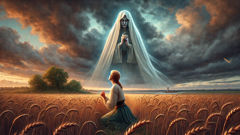
At the heart of the village lives Darya, a widow whose quick wit and steady hand have earned her respect. With three young children and a failing crop, she faces a terrible choice: risk offending the Noon Witch or watch her family go hungry through the winter. As her youngest falls ill and stores dwindle, Darya makes a decision that will echo across generations. She tells her children to stay indoors and ties a red ribbon around her wrist for luck—a charm said to ward off spirits—and enters the fields at noon with a basket and sickle.
The air is thick as soup, heavy with the scent of sunbaked grass and cracked earth. Darya works quickly, heart pounding, eyes darting to every flicker of light. The silence deepens as the village bell marks the hour. A wind stirs—a breath at first, then a rush that sends waves across the wheat. Darya straightens, wiping sweat from her brow, and sees her: the Poludnitsa. The spirit is both beautiful and terrible, taller than any woman, her white robes rippling as if alive. Her face is hidden by a veil of gauzy linen, but her eyes burn gold beneath it.
The Noon Witch circles Darya like a hawk. ‘You know the law of noon,’ she says, her voice echoing with sorrow and warning. Darya bows her head but does not drop her sickle. ‘My children are hungry,’ she says simply. ‘I mean no disrespect, but I must feed them.’ The Poludnitsa’s gaze softens, and the wind quiets for a moment. She asks Darya a riddle: ‘What feeds many but devours itself?’
Darya’s mind races—her own hunger dulling her thoughts—but then she remembers her mother’s words: ‘Bread feeds us all, but once eaten, it is gone.’ She answers: ‘Grain—the wheat that grows for us.’
The Poludnitsa nods slowly. ‘You know the balance. But even grain must rest in darkness before it grows anew.’ She gestures, and suddenly the sky dims, clouds gathering for the first time in weeks. The air cools; thunder rumbles. Darya kneels, thanking the spirit. When she looks up, the Noon Witch is gone, but rain falls in silvery sheets, soaking the fields and the grateful earth.
Darya returns home, her basket full. The next day, the wheat stands taller, revived by the blessing. The villagers speak in awe of her bravery and wisdom. Darya teaches her children—and others in the village—to listen not just for stories of fear, but for those of respect and understanding. She reminds them that the Poludnitsa is not merely a punisher, but a guardian of natural order—a spirit who tests not just the body but the heart.
Over time, Vesenya’s customs grow richer. At midsummer, families place sheaves of wheat at the crossroads and tie red ribbons to the tallest stalks as offerings—not out of terror, but gratitude. Children recite riddles at noon, and elders tell how a mother’s courage brought rain when none dared ask. The legend of the Noon Witch remains, but it is no longer only a threat; it is a lesson in balance, humility, and the deep connection between people and their land.
Conclusion
The legend of the Poludnitsa endures across the centuries—not just as a tale of fear or superstition, but as an emblem of the relationship between human beings and nature’s rhythms. In Vesenya, and in villages all across the Russian steppe, her story is told not just to warn but to teach: about respecting boundaries, honoring wisdom, and knowing when to yield. The Noon Witch is a spirit of both challenge and mercy. She tests those who let pride or desperation blind them to nature’s rules, but she also rewards humility and understanding. Luka’s ordeal humbles a reckless heart, while Darya’s courage and insight turn a curse into blessing. In every generation, there are those who must choose: defy the old laws and risk all, or listen for the lessons that lie hidden in riddle and whirlwind. Today, as wheat sways beneath an open sky and the sun climbs toward its zenith, children still pause at midday, listening for the sigh of wind through grass. They know that in every field, in every moment of decision, the Poludnitsa waits—not as an enemy, but as a reminder that survival depends on respect, balance, and the wisdom to heed both stories and silence. The fields thrive, and so do the people who remember: at noon, even the bravest must rest, and every gift from the land comes at the cost of care.

